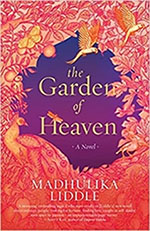This historical fiction tells the stories of a ten-year boy, Madhav, and the family of Sridhar Sahu and Ratna. Their stories, spread across two invasions of Delhi—of Muhammed of Ghur in 1192 CE and Taimur in 1398 CE, tells another very important tale—the way the ‘medieval past’ seems to haunt the present. Madhulika Liddle writes in the mode of scholars who focus on Delhi, such as Sunil Kumar (The Present in Delhi’s Pasts), Percival Spear (Delhi, Its Monuments and History), RE Frykenburg (Ed. Delhi through the Ages), Narayani Gupta (Delhi between Two Empires 1803-1931) and Upinder Singh (Ancient Delhi). Like these historical narratives, The Garden of Heaven situates the geographical areas in present-day New Delhi during the period 12th to 14th century AD, when Muslim dynasties entered Delhi and the structures of Qutub Minar, Hauz, and Jami Masjid were built using materials from Hindu and Jain temples. We learn about these monuments through the eyes of stone cravers such as Balram and Madhav, and distant memories of Musa Dadu and Shagufta. And through their lives, we enter into memories of communal distinctions and harmonies which almost every Indian regards as a part of her country’s social history. Here we see the inevitable confrontation between what one knows through one’s own experience, what one can learn secondarily from others, and what one can glean from the stories one hears concerning the origins of civilization, and its philosophical context. Just as words find meaning in the syntactic framework of the sentence and the sentence in the paragraph, so do monuments and people gain meaning within a context of genealogy, travels, stories of origin and beliefs—the understanding of man’s place within the universe. In the strict sense that history represents factual, verifiable knowledge, the greater part of what we call history or write as historians is clearly fiction. And as a novelist, Liddle, repeatedly (almost joyously) blurs these distinctions.
March 2022, volume 46, No 3


Very interesting info!Perfect just what I was looking for!Raise range
Come on directly into a world where curvy women come in charge and every picture oozes desire. Have a look at our awesome versions and sexy content that will have you wanting more. Whether you like an all natural look or something a bit more enhanced, we’ve got all shapes and sizes to fulfill your fantasies. Each entire body is a masterpiece of design in its own special way. Dive into a world filled with breasts of all shapes and sizes, each more captivating compared to the last. Sexy ladies with big boobs constantly catch the eye HUGE BOOBS WITH HUGE DICKS XXX GALLERY. If you are into lush breasts, you’ve come to the right location. Our galleries feature women with amazing boobs, both true and enhanced, taking pleasure in steamy encounters with guys who can’t withstand their curves. With a variety of women and boob dimensions to make sure you everyone, we’re an ideal spot for a wild night. Get lost in our mesmerizing photos which will leave you wanting more. Don’t wait, jump into the hot picture galleries on our site for the best collections in this popular category.
Dive into a collection of stunning photos featuring attractive women with women-with-big-boobs-giving-head-and-getting-cumed-on who understand how to bring the heat in the bed room. Whether they’re newbies or advantages, these babes could keep you glued to your display screen with their steamy encounters. We’ve handpicked the very best of the greatest to showcase females with ample property. Watch as they rock your preferred positions and show off their bouncing skills. Prepare yourself to end up being captivated by the irresistible allure of large tits in a world where passion may be the only thing that counts.